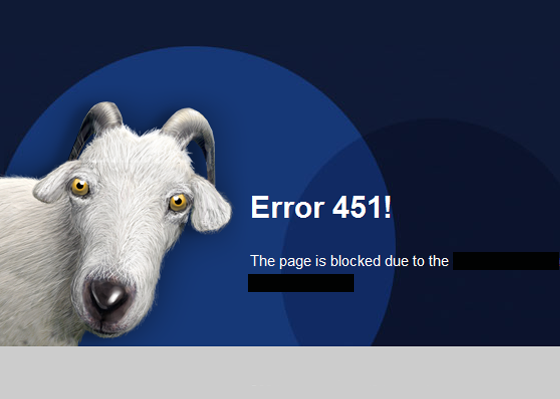Internet Management - Overview
What is possible is not yet known, and what is impossible is impossible. (“Snail on the slope”, Strugatsky brothers)
Part 1. Internet history: control cannot be freed

Rabbits, as you know, are not only valuable fur. Without the Internet, there would be no memes, school essays, chats, startups, dot-com and a good part of our leisure time, and, of course, the profession of a web programmer.
The Internet was created for the defense of the USA (first of all from the USSR). The first message transmitted was two LO letters in 1969, and the first cable was stretched to other states two years later. The concept of the world wide web was proposed by Tim Berners-Lee in 1989, he also invented HTML and the HTTP protocol. The W3C consortium, which is responsible for most of the technological standards of the WWW, appeared in 1995 - it was then that the network got a more or less modern appearance, and in 2011, the right to access the Internet was included in the list of basic UN human rights.
')
The commercial potential of the network became clear already in the early 90s, but the states thought for a long time: perhaps they seriously got down to business as early as 2003, when the World Summit on the Information Society was held for the first time. The declaration adopted at the Summit stated: “political authority over Internet-related public policy issues is the sovereign right of states. States have rights and obligations with regard to Internet-related international policy issues. ”
And away we go.
In 2014, the number of WWW users was more than 2.6 billion (data from the Global Web Index). Resources are distributed at random, and there is no single control center for everything that happens - rather, there is a whole company of managers and those who want to control a little too. So, for today, the key organization among managers is probably ICANN , which manages the database of root domain names, distributes blocks of IP addresses, and much more. Technological standards are managed by the W3C and the IETF . All of them were formed and still have headquarters, mostly in the United States.
Nevertheless, it is necessary to negotiate with other countries, and the role of states as a whole is gradually increasing: the idea of control over the content of the Internet attracts many. There are several ratings that assess online censorship, and they do not always agree in opinion.
Thus, the French organization Reporters Without Borders has been updating the list of Enemies of the Internet since 2006. Since 2012, it includes Belarus, Bahrain, Myanmar, China, Cuba, Iran, North Korea, Saudi Arabia, Turkmenistan, Uzbekistan, Vietnam; from 2014 - Russia, Ethiopia, Sudan, Turkmenistan, United Arab Emirates, United Kingdom and United States. “Americans have the same online freedom as Putin’s subjects” - this is how they wrote in one of the reports.
Among the freedom fighters of all categories, for starters, I will call Google (on the site, among other things, you can subscribe to newsletters on the topic) and the Internet Defense League . Among the latest members are Mozilla, WordPress and Reddit. The League invites everyone to add a script to its website that will show instructions on how to use VPN and anonymizers to bypass prohibitions to those visitors who are blocked from access. They invite to join the movement and programmers, especially JavaScript.
The situation in Europe is ambiguous with blocking: there is an extremely high percentage of Internet penetration into society, but the countries of the former USSR occupy the last place - if in Iceland, for example, 95% of the population use the Internet, in Russia - 53%, Belarus - 47%, Ukraine - 34%.
Part 2. Does North Korean sadness threaten Europe?
I also saw one writer executed in China. He then published his feelings on the Internet. (Dawn House)
The hit of 1992 hire The Lawn Mower ends spectacularly: the psychopathic protagonist “dives” into a computer, from where his mind penetrates immediately into all databases. To boast a passion as you want - so he began to call all the phones in the world at the same time. And to us, the audience, it was clear that he became the king of the Internet, and the world at the same time.
“Fantastic,” they say, “ha-ha!” And it seems to me that since then no one has simply managed to “dive”. Meanwhile, our states with you were not asleep, but colonized the network in their own way, but it’s bad to figure out, or you have to do it yourself.
| Internet users, 2016 | BY | Ru | UA | FR |
| Total | 4 856 969 | 84 437 793 | 16 849 008 | 55 429 382 |
| Growth for the year | 9% | ten% | 9% | 3% |
| Percentage of population | 52% | 59% | 37% | 86% |
| Proportion of all users in the world | 0.17% | 2.91% | 0.58% | 1.91% |
| Control | 64 | 62 | 37 | 24 |
| Power criticism | + | + | + | |
| Power conflicts | ++ | |||
| Conflicts | + | ++ | + | + |
| Corruption | ++ | |||
| Political opposition | ++ | ++ | ||
| Social comments | + | + | ||
| Blasphemy | + | |||
| Uprising | ++ | |||
| Lbgt | + | + |
* user data - Internet Live Stats, 2014
** data on Internet freedom - Freedom House, 2015
All Western Europe is in the zone of almost complete "lack of control", although there are also alternative ratings. Reporters Without Borders, for example, in 2014 included the UK in the list of "enemies of the Internet". In North Korea, the situation is well known and, of course, the country is on the list of "enemies".
Other countries are also interested, but at first somehow sluggish. In 2010, the EU Commission stated that the Internet must be managed, otherwise the EU’s income is not what it could be, and not for three kopecks, but for 400 billion-something euros. In general, in 2015, the ice started off - the strategy of the “Single Digital Market” (the Digital Single Market) came to light. It’s about the fact that there is no geo-blocking in Europe, but a high-speed connection, a single legislative base, net neutrality, and all sorts of pretty pleasant things.
They assess the “Internet advancement” of EU members by 5 indicators: infrastructure, human capital, Internet use, integration of business and digital technologies, eGovernment.

And now about the urgent affairs in order of increasing "rating".
Ukraine
According to OpenNet , in 2010 no censorship was observed in Egypt, France, Germany, Ukraine, Great Britain and the USA. Ukraine was proud for a short time: the Freedom of the Net report from 2014 pointed to a significant downgrade, and since then the country has been included in the “partially free countries” category. Apparently, the politicians were offended: in 2015 , the National Commission for the Protection of Public Morality, which had existed for three years, was liquidated .
Recently there have been reports that some Ukrainian providers follow the instructions of RosKomNadzor (about it below) - for example, Vodafone Ukraine and FRINET. The reason for this is that some Ukrainian providers, in some areas, may use Russian providers as uplinks (uplink, backbone provider). Therefore, they will be subject to the relevant restrictions.
Russia
Only no one heard about Roskomnadzor, and everyone, of course, knows that you can check which site is blocked here . From the well-known cases of recent years can be called “harassment” of Wikipedia, blocking Lurkmore, RuTracker and recently - online lotteries .

The open letter, signed in 2015 by Mikhalkov, the Minister of Culture Vladimir Medinsky and the Deputy Prime Minister Dmitry Rogozin, who called for the creation of “Patriotic Internet”, caused a stormy reaction.
DOU, the largest resource for IT professionals in Ukraine, and maybe in the CIS, was recognized extremist in 2014. They resist state censorship, such as the Pirate Party , RosKomSvoboda and others.
In Belarus
... the first blocking began in 2001, and in 2010 the current government was authorized to control any channels of communication. Service providers are obliged to identify subscribers and their devices and fulfill the requirements for restricting access to information. Among the blocked sites, for example, for some time was onliner.by, the 5th most popular website in the country, which is dedicated to digital technology, and the Belarusian Partisan, which is in the risk zone, more obvious to the average person.
Under the Internet censorship of the country falls and discussion of Internet censorship of the country.
All this pushes one more time to think about what should be regulated and what should not be touched while it is working. I remember the “Black Mirror” and the fact that from 1982 to 1989 Anatoly Klesov was the only person in the USSR who visited the network.
Part 3. The Tower of Babel is transferred ... to the Internet

'Leading the Web to Its Full Potential' is the W3C slogan, which has been headquartered at MIT for 21 years under the leadership of Tim Berners-Lee, the inventor of the World Wide Web. This organization, or consortium, develops most of the technological standards for the web: HTML, DOM, SVG, and others. Some of the work W3C performs through grants from various structures , in particular, from the United States, the European Union, IBM and Adobe.
W3C standards are in the nature of recommendations, and are not mandatory. Anyone can share their opinion about them, even without a membership card. The main thing - do not miss call for review. W3C, of course, think about their role in Internet governance and its impact on technology - in 2012 they even began to write work on how Internet Governance and Web Architecture correlate, but for some reason they did not finish .
Body standards. So, Ecma said, “Oh, I’m looking for ECMAScript.” It sounds like a skin disease. ”
Brendan Eich, JavaScript creator

The standards for JavaScript / ECMAScript are the responsibility of the ECMA (European Computer Manufacturers Association), which recently released ECMAScript 6 . In addition to it, a number of organizations are involved in the management of Internet technologies. Brendan Eich, the creator of the most popular language in the world, also keeps his blog , in which he talks about the future, news, and tells how to live further.
I will try to highlight interesting areas of regulation for the developer:
- International friendliness of the site - encoding, language declaration and the like is checked here . How to design forms for filling / database, as well as how to make the address of the site , if it is multilingual.
- Vulnerability. You can check it, for example, here and here , but you can. first listen to the detailed podcast .
- Site loading speed - standard and validation from various points of the world .
- Support for various technologies with geolocation.
- Check how the site complies with the standards, and here - download time broken down into individual components.
- Privacy , storage and protection of user data, plus laws by country.
- Pay online by W3C.
- Accessibility.
This, of course, not all. Although numerous standards should be observed, they develop websites not for browsers, but for people. If it seems that something is wrong with this - you can join the discussion .
Why not. Maybe someone from the readers already doing this? I would be grateful if you tell.
"It can be used for good or evil." [...] Let's use neat new exciting things. Let's use the Web to help people understand each other. ”(Tim Berners-Lee)
Source: https://habr.com/ru/post/356002/
All Articles